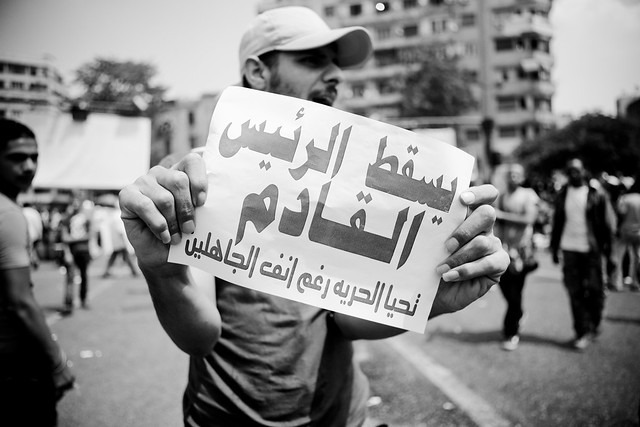On today's podcast, we talked about the disturbing lawlessness that is the result of Egypt's political polarization and of the erosion of trust in state institutions. We didn't discuss the escalating sexual violence against women that has become a regular phenomenon at protests in Egypt.
I think I know, for myself, why I haven't brought this topic up much. It's because I find it too awful. Read this article, if you can bear to, by Egypt Independent's (as often, daring to speak of a subject skirted by most of the media) news editor Tom Dale. I've read too many similar accounts in the past. They make me heartsick. And I would rather not write, and not think, of these incidents because I am frightened and confused by them. And ashamed for Egypt, a country I've lived in 10 years now. These acts -- let's just call them what they are, these gang-rapes -- do not fit with my experience of Egypt, where the constant harassment, the plentiful misogyny have always been balanced by a sense of being, fundamentally, in safety, capable of calling on those around me to enforce a shared code of decency, to stop anything truly terrible from happening.
I'm in awe of Egyptian women -- and fellow female journalists -- who continue to expose themselves to pain and danger and humiliation to participate in and witness this country's history. I commend the groups that are trying to fight this. I myself no longer feel safe in Tahrir. I don't cover daily news these days, and I don't go there.
I hesitated before titling this post, because it puts a knot in my stomach to place those words together. Because I worry that this post will be used to smear the opposition, to make hateful generalizations about Muslim countries. But it is the correct term (the assaults in Tahrir, although they don't generally seem to involve full sexual intercourse, definitely meet the WHO definition of rape). And for the women who are victims of these attacks...I can't think of a worse betrayal of their trust in their fellow-citizens and in the promise of the revolution, of their belief that they can safely join a peaceful protest in a major square in their capital city.
This is not a reflection on the revolution that took place two years ago -- it is evidence of how far, and into what a dark thicket, we have traveled since then. Who are the men doing this? It almost doesn't matter, because where and how these attacks are taking place -- amidst thousands of bystanders, in the heart of Cairo, in the open -- indicts everyone.



